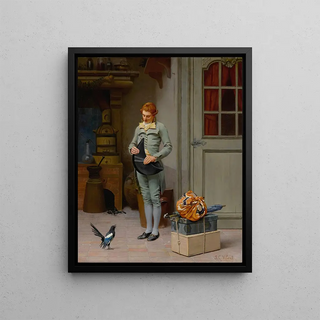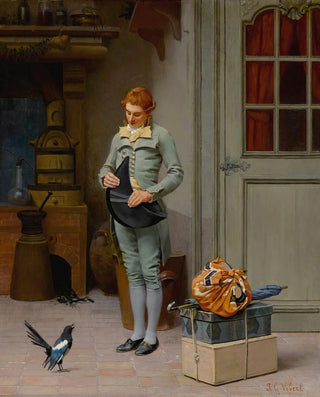Art print | The New Clerk - Jehan Georges Vibert


View from behind

Frame (optional)
Art print Le Nouveau Commis - Jehan Georges Vibert – Captivating Introduction
In the vibrant universe of art, some works manage to capture the very essence of an era while transcending the boundaries of time. "Le Nouveau Commis" by Jehan Georges Vibert is one such creation. This painting, which delicately evokes the atmosphere of Parisian salons of the 19th century, immerses us in a world where elegance and savoir-vivre are celebrated. Vibert, through this piece, invites us to explore the customs and behaviors of his time, while offering a critical perspective on social classes. The scene he depicts is both lively and subtle, revealing a world where the art of conversation and refinement are fundamental values.
Style and uniqueness of the work
Jehan Georges Vibert's style is characterized by an exceptional mastery of light and color, which give his compositions a warm and welcoming atmosphere. In "Le Nouveau Commis," the meticulous details of the faces and clothing of the characters testify to striking realism. The artist skillfully plays with textures, making the richness of fabrics and the shine of accessories almost tangible. The work also stands out for its arrangement, where each element is carefully placed to create a harmonious balance. The characters, although frozen in time, seem animated by an inner life, a psychological depth that draws the eye and stimulates the imagination. Far from being a simple genre scene, this painting resembles a true narrative tableau, inviting the viewer to reflect on human relationships and social dynamics.
The artist and his influence
Jehan Georges Vibert, born in 1840, was a French painter whose work is rooted in the tradition of realism and naturalism. Trained at the École des beaux-arts in Paris, he established himself as a keen observer of the customs of his era. His work is marked by a pronounced taste for social satire, and he does not hesitate to use humor to denounce the vices of the bourgeoisie. Vibert drew inspiration from the masters of the past while developing a personal style, combining finesse and vitality.

Matte finish

View from behind

Frame (optional)
Art print Le Nouveau Commis - Jehan Georges Vibert – Captivating Introduction
In the vibrant universe of art, some works manage to capture the very essence of an era while transcending the boundaries of time. "Le Nouveau Commis" by Jehan Georges Vibert is one such creation. This painting, which delicately evokes the atmosphere of Parisian salons of the 19th century, immerses us in a world where elegance and savoir-vivre are celebrated. Vibert, through this piece, invites us to explore the customs and behaviors of his time, while offering a critical perspective on social classes. The scene he depicts is both lively and subtle, revealing a world where the art of conversation and refinement are fundamental values.
Style and uniqueness of the work
Jehan Georges Vibert's style is characterized by an exceptional mastery of light and color, which give his compositions a warm and welcoming atmosphere. In "Le Nouveau Commis," the meticulous details of the faces and clothing of the characters testify to striking realism. The artist skillfully plays with textures, making the richness of fabrics and the shine of accessories almost tangible. The work also stands out for its arrangement, where each element is carefully placed to create a harmonious balance. The characters, although frozen in time, seem animated by an inner life, a psychological depth that draws the eye and stimulates the imagination. Far from being a simple genre scene, this painting resembles a true narrative tableau, inviting the viewer to reflect on human relationships and social dynamics.
The artist and his influence
Jehan Georges Vibert, born in 1840, was a French painter whose work is rooted in the tradition of realism and naturalism. Trained at the École des beaux-arts in Paris, he established himself as a keen observer of the customs of his era. His work is marked by a pronounced taste for social satire, and he does not hesitate to use humor to denounce the vices of the bourgeoisie. Vibert drew inspiration from the masters of the past while developing a personal style, combining finesse and vitality.






